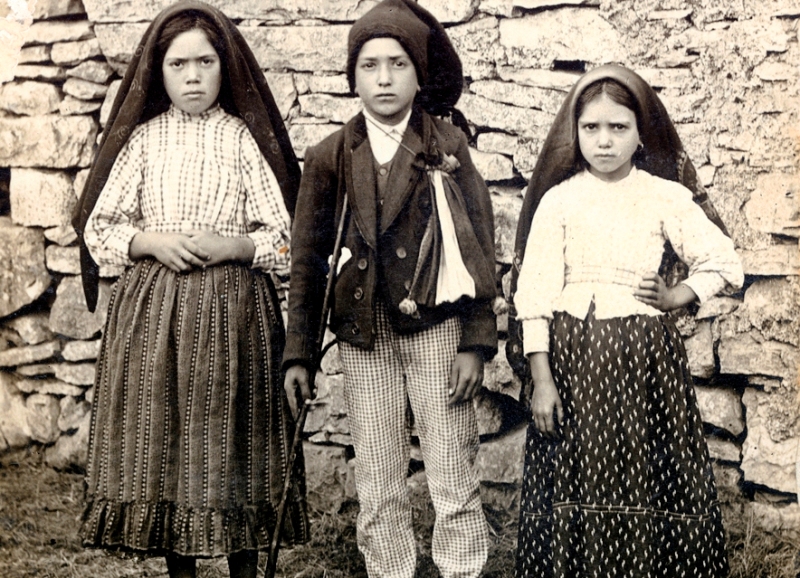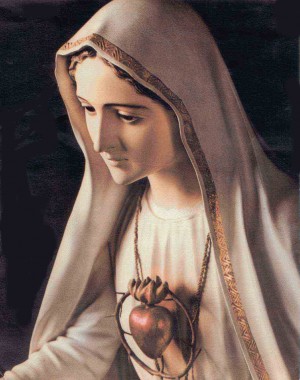An Oblate of Silverstream on Fatima and the Desert Fathers

Marco da Vinha and his wife, Isa, are Oblate novices of Silverstream Priory. Marco and Isa are the parents of Helena and Cristóvão. They make their home in the U.K., while remaining deeply rooted in Portugal, Mary’s Land, la Terra de Maria.
Fátima and the Desert Fathers
by Marco Gregory da Vinha, Obl.O.S.B.
 I find myself writing today about a topic which I never thought I would – Fátima; specifically, the message of Fátima (or, at least, how I have come to understand it). Caveat: for those that came here expecting some comment on “the Consecration of Russia”, you can forget about that. That is a topic I’m not at all interested in touching. Let’s just say that I believe that that request was very time-specific, and is not necessarily what the “message” was all about, though it seems to me that to many it carries an almost messianic weight.
I find myself writing today about a topic which I never thought I would – Fátima; specifically, the message of Fátima (or, at least, how I have come to understand it). Caveat: for those that came here expecting some comment on “the Consecration of Russia”, you can forget about that. That is a topic I’m not at all interested in touching. Let’s just say that I believe that that request was very time-specific, and is not necessarily what the “message” was all about, though it seems to me that to many it carries an almost messianic weight.
Love it or hate it, every Portuguese knows Fátima and has probably been there at least once in their life. In the minds of not a few, Fátima is something quite apart from the Church. How many times did I not hear from people (who even made regular pilgrimages there): “I don’t believe in the Church, but I have a lot of faith in Fátima.” I never understood what that was supposed to mean. What do those who profess such a belief understand Fátima to be? Does it mean you believe in some “miraculous” event, some “force” you keep a mercenary relationship with? Or does it mean that you believe in the message? If so, then you must necessarily believe in the Church. Our Lady cannot be understood apart of the Church; she is a type of the Church. If you believe in her, and not the Church, then there is something seriously flawed with your belief.
But I digress…
Fátima (Cova da Iria) is about an hour and fifteen minutes drive on the motorway from my home city. Now that I stop to think about it, I (providentially?) made my official return to the Church there 10 years ago. For almost two years I drove down every Sunday so as to be able to experience the vetus ordo of the Roman rite (and occasionally the Divine Liturgy at the local Ukrainian Greek Catholic chapel at Domus Pacis). When people found out that I would go to Fátima every Sunday they would say “Wow, you must have a lot of faith in Fátima.”, but it had never crossed my mind, in all those trips, that I was going there because of Fatima; if anything, in my mind, Fátima was accidental: the vetus ordo just happened to be celebrated there. As time went on, I began to have a bit more of a “sacramental” understanding of the place, and so the shrine (or at least the area of the chapel of the apparitions) became a kind of holy ground. The Deipara, the Dei genetrix, had appeared there; she had hallowed the ground (or at least the oak tree) by her contact. In my mind, that made the immediate vicinity a kind of contact relic, and so I would always stop by, even if just for 5 minutes, to say “hello” and entrust to her care my vocation, whichever it might be. Several years later, Sr. Maria do Rosário and I were received as novice Benedictine oblates at Fátima.
During these many years I had struggled to understand just what exactly was the “message of Fátima” or why “the world needs Fátima“. Searching for answers on the internet only served to further the confusion. I had never stopped to read any proper literature on the apparitions; I only got bits and pieces of the story from time to time from speaking with people who had purposely moved to Fátima from abroad, as well as from someone who had known Sr. Lucia for many years and served as an interpreter of sorts for her. However, it was only after Father Prior had spoken with the postulator for Bl. Francisco’s cause that things suddenly start to click in my head. To quote Father Prior’s own words:
I put the question to Dr Coelho. She explained that while little Jacinta was an extrovert, easily engaging with others and concerned in reaching out to all, especially to poor sinners, Francisco was a very interior soul, focused on God alone or, as he himself put it, on consoling the Hidden Jesus. In this way, the personalities and graces of Francisco and Jacinta are complementary. Jacinta is emblematic of the missionary impulse of the Church, while Francisco illustrates the call to the hidden life and total dedication to the “One Thing Necessary” (Luke 10:42). Francisco, explained Dr Coelho, was, from the very beginning of the apparitions, singled out as a contemplative soul.
The Postulator explained that had Our Lady said that Francisco was to become a “contemplative soul”, the meaning of her words would have completely escaped Francisco’s understanding. His was the simple vocabulary of a child, of a boy accustomed to the concrete realities of nature. Our Lady’s words that Francisco would “need to say many rosaries” before going to heaven was, in effect, her way of saying that Francisco was to become an entirely contemplative soul before going to heaven, and this by means of many rosaries. Understand by this that, for Francisco and for most ordinary people, many rosaries are the most simple and efficacious way to union with God.
For some time I had begun to see the message of “penance and prayer for the conversion of sinners” as synonymous with the Gospel, which made me wonder what was so unique about the apparition(s) and its message. Suddenly, with the postulator’s comment about Our Lady adapting her language to her interlocutors/audience, it made sense.
What was Our Lady trying to tell us? What had we forgotten?
Penance – mortifications; prayer for the conversion of sinners – intercession; pray the Rosary – the layman’s office par excellence in the West. Our Lady was reminding a simple people, a people of simple faith, of what it means to be Christian. I don’t mean simple in a pejorative sense; I mean simple in childlike, unable(?) to understand complex theological ideas, but faithful enough to intuit them, with a lively sensus fidelium. In very simple terms, she was reminding them of their baptismal priesthood. Sons in the Son, they could unite their sufferings, their mortifications, to Christ’s, to “make up what is lacking in the sufferings of Christ” (cf. Col 1:24). As Our Lord had offered Himself up on the Cross for sinners, so they were to become icons of all mankind, offering in themselves all to the Father, through the Son, in the Holy Spirit, especially for those who did not believe. The daily rosary was an injunction to “pray without ceasing”. For a long time the rosary had been an alternative to the Office for those who were unable to read. The Office, especially through the Psalms, shows us the vultus Christi; praying the Psalms helps one to acquire the mind of Christ. Being unable to do that, one turns to Mary, and in contemplating her, one can see in her face the face of her Son shining through.
“Fátima”, in my understanding of it, is nothing “new”. The message is the Gospel. It is the life that finds echo in the life of the Desert Fathers. The Desert Father’s lived a(-n extreme) life of penance, of mortification; one needs only to read their sayings to see how indispensable it was to them, how essential it was to cultivate humility. It was not something negative; rather it was liberating. See, for example, this saying of Abba Poemon:
A brother questioned Abba Poemen saying, ‘I have committed a great sin and I want to do penance for three years.’ The old man said to him, ‘That is a lot.’ The brother said, ‘For one year?’ The old man said again, ‘That is a lot.’ Those who were present said, ‘For forty days?’ He said again, ‘That is a lot.’ He added, ‘I myself say that if a man repents with his whole heart and does not intend to commit the sin any more, God will accept him after only three days.’
Even on their deathbed penance was still (or should that be especially?) on their minds:
It was said of Abba Sisoes that when he was at the point of death, while the Fathers were sitting beside him, his face shone like the sun. He said to them, ‘Look, Abba Anthony is coming.’ A little later he said, ‘Look, the choir of prophets is coming.’ Again his countenance shone with brightness and he said, Look, the choir of apostles is coming,’ His countenance increased in brightness and lo, he spoke with someone. Then the old men asked him, ‘With whom are you speaking, Father?’ He said, ‘Look, the angels are coming to fetch me, and I am begging them to let me do a little penance.’ The old man said to him, ‘You have no need to do penance, Father.’ But the old man said to them, ‘Truly, I do not think I have even made a beginning yet.’
Continual prayer was also a theme on the minds of the Desert Fathers. They knew, through their experience, that it required a great effort to become a habit, especially if one was to pray without ceasing, which in a goal of all Christians, which they will one day do perfectly united to Christ, the Eternal High Priest. The Psalms were their school of prayer.
Abba Agathon said, “Prayer is hard work and a great struggle to one’s last breath”.
Having withdrawn to the solitary life he made the same prayer again and he heard a voice saying to him, ‘Arsenius, flee, be silent, pray always, for these are the source of sinlessness.’
The brethren also asked him, ‘Amongst all good works, which is the virtue which requires the greatest effort?’ He answered, ‘Forgive me, but I think there is no labour greater than that of prayer to God. For every time a man wants to pray, his enemies, the demons, want to prevent him, for they know that it is only by turning him from prayer that they can hinder his journey. What ever good work a man undertakes, if he perseveres in it, he will attain rest. But prayer is warfare to the last breath.’
We find as well stories of the Fathers’ intercession for sinners:
One day Abba Serapion passed through an Egyptian village and there he saw a courtesan who stayed in her own cell. The old man said to her, ‘Expect me this evening, for I should like to come and spend the night with you.’ She replied, ‘Very well, abba.’ She got ready and made the bed. When evening came, the old man came to see her and entered her cell and said to her, ‘Have you got the bed ready?’ She said, ‘Yes, abba.’ Then he closed the door and said to her, ‘Wait a bit, for we have a rule of prayer and I must fulfill that first.’ So the old man began his prayers. He took the psalter and at each psalm he said a prayer for the courtesan, begging God that she might be converted and saved, and God heard him. The woman stood trembling and praying beside the old man. When he had completed the whole psalter the woman fell to the ground. Then the old man, beginning the Epistle, read a great deal from the apostle and completed his prayers. The woman was filled with compunction and understood that he had not come to see her to commit sin but to save her soul and she fell at his feet, saying, ‘Abba, do me this kindness and take we where I can please God.’ So the old man took her to a monastery of virgins and entrusted her to the amma and he said, ‘Take this sister and do not put any yoke or commandment on her as on the other sisters, but if she wants something, give it her and allow her to walk as she wishes.’ After some days the courtesan said, ‘I am a sinner; I wish to eat every second day.’ A little later she said, ‘I have committed many sins and I wish to eat every fourth day.’ A few days later she besought the amma saying, ‘Since I have grieved God greatly by my sins, do me the kindness of putting me in a cell and shutting it completely and giving me a little bread and some work through the window.’ The amma did so and the woman pleased God all the rest of her life.
Is Fátima still “relevant”? I think it is particularly poignant a century later because it obliges us to ask “What have we forgotten?” It seems to me to be quite providential that our Blessed Mother should remind us of this supernatural aspect of the faith on the eve of a revolution of the “anti-Gospel”, of a materialistic “gospel” that promised an immanenitized eschaton. And yet, 100 years later, on the cusp of the anniversary of the apparitions, if one listens to the majority of the “testimonies” about the meaning of Fatima on this website (which is backed by the Sanctuary and a Catholic radio station), one will find that we have forgotten much. The majority of those testimonies of what Fátima means to those individuals is focused to much on me, on vague concepts of love and peace and feeling good with one’s self, a form of spiritual hygiene. God does not figure into the picture. The faith is primarily about the world here below, a convenient ethical system, but little beyond that.
We have forgotten the Cross. It is the Cross, the dulce lignum, that best encapsulates the Faith. In trying to make it more appealing, in applying so much cosmetic to sweeten the pill, we have gone so far as to forget what it is all about.
What is Fátima to me? Fátima is the unbroken tradition of the Church; Fátima is the life of monks and religious and clerics and lay alike; Fátima is the faith of the Desert Fathers – Fátima is the Christian life in broad strokes, so simple enough even a child could understand it. And it is a reminder to make every day a beginning.


It seems impossible to think of Fatima without hearing always Our Lady’s urgent pleas that we sacrifice and pray for the conversion of sinners, her admonition that souls are being lost for the lack of our fervor and offering of our daily sufferings. How is this not preached from our pulpits? But in forty years as a Catholic, I have not heard it preached–not even once!
Thank you for this wonderful reflection to mark this year’s important anniversary. We will be visiting Fatima next week as part of our pilgrimage to Portugal.
We would be interested in assisting at an EF Mass there or near Lisbon, but I haven’t been able to determine where the usus antiquior is celebrated in that part of the country.
Aside from the shrine, the Church of the Holy Miracle in Santarem, and the major churches in Lisbon, are there any special places you would recommend that we visit during our pilgrimage?
Thanks and God bless!
There is a weekly vetus ordo Mass in Lisbon, on Saturdays at the church of St. Nicholas; on Sunday the only option available to the laity would be the FSSPX.
I would recommend visiting the 2nd largest Marian shrine in Portugal (in Braga), Our Lady of Sameiro. Actually, Braga has not a few places of religious interest. Also worthy of interest would be to visit in Coimbra the monastery of the Holy Cross in Coimbra (where St. Anthony lived as an Augustinian before becoming a Franciscan) as well as the church where reposes St. Isabel of Portugal.